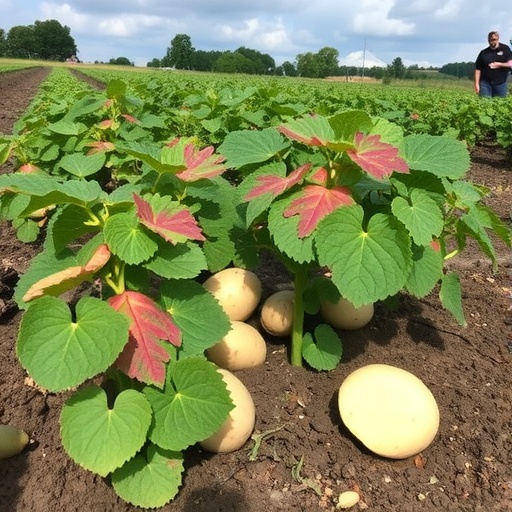In the evolving field of agriculture, researchers are continually striving to develop strategies that enhance crop resilience, particularly in the face of plant diseases that can dramatically affect yield and food security. One notable study recently published in Discover Agriculture shines a light on the significance of cultivar-specific responses to late blight in highland potato production, a development that has far-reaching implications for both farmers and agricultural scientists. Potatoes, which are a staple food across many regions, are notably vulnerable to the late blight disease, caused by the oomycete pathogen Phytophthora infestans. This organism has the capacity to rapidly devastate crops, leading to catastrophic economic losses.
In their research, Bhatta and colleagues delve into the genetic and phenotypic variations among different potato cultivars in high-altitude farming situations. Highland regions often present unique climatic conditions and soil types that can influence how plants respond to environmental stressors, including pathogens like P. infestans. This study specifically investigates how varying genetic backgrounds can lead to differing levels of susceptibility or resistance to late blight. The findings provide crucial insights for farmers in selecting the most appropriate potato varieties that can thrive and maintain productivity even under the threat of disease.
Furthermore, the researchers utilized a range of methodologies to assess the late blight resistance across several popular potato cultivars. These methods included field trials and controlled environment experiments designed to simulate the onset of late blight under realistic agricultural practices. By correlating these experimental results with molecular data and phenotypic observations, the study highlights the complexity of plant-pathogen interactions and underscores the importance of holistic approaches to breeding disease-resistant potatoes.
Analysis of environmental factors also played a critical role in the study. The researchers explored how altitude, humidity, temperature fluctuations, and soil composition can all impact the growth and resistance profiles of different potato cultivars. This is particularly important in highland areas where microclimates can significantly alter disease dynamics. Understanding these interactions improves farmers’ capabilities in managing crop health through strategic planting and resource allocation.
The implications of this research extend beyond local agricultural practices. As global food systems face increasing pressures from climate change and population growth, the need for resilient crop varieties becomes more urgent. By identifying cultivars that can withstand diseases while maintaining yield quality, this study contributes to the broader goal of achieving sustainable agriculture. It encourages not only farmers but also policymakers to invest in research and development that supports the cultivation of resilient crops.
An essential takeaway from Bhatta et al.’s work is the necessity of tailored agricultural practices. The study urges a move away from a one-size-fits-all mentality regarding crop cultivation. Instead, it advocates for a more nuanced understanding of cultivar performance in relation to specific environmental contexts. Farmers should consider local conditions when selecting potato varieties, and agricultural extension services must facilitate access to resistant cultivars, ensuring that farmers are well-informed and prepared for potential disease outbreaks.
Educating farmers about the benefits of these specific cultivars can lead to improved adoption rates and enhanced food security. Training programs that incorporate findings from this research will be pivotal in fostering an informed farming community capable of mitigating the risks associated with late blight. Furthermore, integrating modern agricultural technologies, such as molecular breeding and selection techniques, can accelerate the development of high-resilience cultivars.
The economic analysis presented within the study also highlights that the cost-effectiveness of adopting resistant cultivars must not be overlooked. Although initial investments in new seeds may be required, the long-term savings associated with reduced pesticide usage and increased crop yields justify such investments. Farmers are likely to benefit not only from healthier plants but also from higher profits due to lowered operational costs and increased market competitiveness.
In conclusion, Bhatta et al. have made strides in elucidating the complexities surrounding potato cultivars and late blight resistance. Their findings suggest a path forward for agricultural innovation that prioritizes both genetic diversity and environmental considerations. As further research in this domain progresses, it may well lead to the development of potato cultivars that can thrive in various climates and withstand the changing landscapes of global agriculture.
This groundbreaking research stands to benefit not only those in highland regions but can be extrapolated to various geographic locales where potatoes are cultivated. By embracing the diversity within potato genetics and understanding the environmental impact on plant disease resistance, the agricultural community can work towards sustainable solutions that promise productive harvests today and into the future.
Emphasizing the necessity for continued research into crop resilience and adaptability, Bhatta and colleagues pave the way for integrating genetic insights with practical farming techniques, offering a beacon of hope for farmers struggling with the ever-present threat of late blight.
In today’s world, where the climate is unpredictable and food security is paramount, this research represents a critical step in ensuring that future generations have access to healthy, abundant food supplies. The nuances of cultivar-specific responses to late blight underline the importance of tailored agricultural solutions, which could ultimately lead to a healthier planet and a secure food future for all.
Subject of Research: Cultivar-specific responses to late blight in highland potato production
Article Title: Cultivar-specific responses to late blight in highland potato production
Article References:
Bhatta, K., Lamichhane, S., Sipkhan, P.R. et al. Cultivar-specific responses to late blight in highland potato production.
Discov Agric 3, 242 (2025). https://doi.org/10.1007/s44279-025-00426-x
Image Credits: AI Generated
DOI: https://doi.org/10.1007/s44279-025-00426-x
Keywords: late blight, potatoes, cultivar-specific responses, highland agriculture, food security, plant genetics, sustainable agriculture, disease resistance
Tags: Agricultural resilience strategiescrop disease managementcultivar selection for farmersgenetic variations in potatoeshigh-altitude farming challengeshighland potato cultivarslate blight disease resistancephenotypic responses to pathogensPhytophthora infestans impactpotato yield and food securitysustainable agriculture practicestailored cultivar responses





